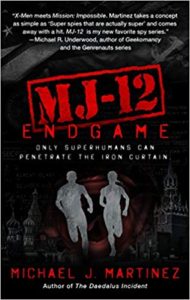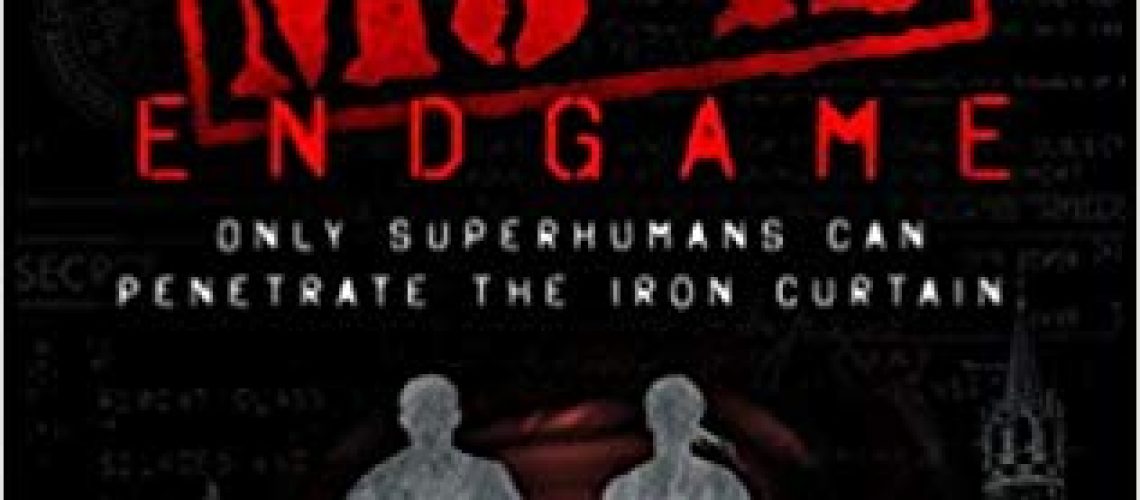The MJ-12 series (MJ-12 Inception, MJ-12: Shadows) comes to a successful conclusion in Mike Martinez’s MJ-12 Endgame, where a plot by Lavrentiy Beria to take control of the Soviet Union after Stalin’s death will help decide the fate of Variants across the world.
MJ-12: Endgame does not waste any time in dropping us into the world of Mike Martinez’s MJ-12 ‘verse, an alternate world where people given superpowers by two mysterious vortexes at the end of the second World War are recruited into the intelligence agencies of the USA and the USSR to covertly thwart the plots and plans of the other side.
The novel takes place a couple of years after the second volume in the series, MJ-12: Shadows. The world is different in 1953. For one thing, Eisenhower is now President, and the relatively close relationship Truman had with the MJ-12 program is now replaced by a different, more distant relationship with President Eisenhower. More central to the plot, though, Stalin is dead (or more accurately, dies in the first chapter). The wake of Stalin’s death, like the death of any autocrat, be it the head of the USSR or the Roman Empire, without clear successor, means that there is a power struggle in the making. There are several candidates to rise to that exalted rank, none more than Lavrentiy Beria, fearsome for his secret police connections. But Khrushchev and his fellow aspirants do not know one secret card that Beria has to play in this power struggle.

For, as we learned in Mj-12: Shadows, Beria is a Variant himself. He knows and controls all the Variants in Russia. And he has a Plan.
As always, the MJ-12 series is highly educational about real Cold War events in a way that, I think, can be favorably compared to exemplars of this subgenre such as Tim Powers’ DECLARE. I had no idea there was really an uprising in East Germany in 1953, and as in previous novels, Martinez uses the real life events and tells stories around them, and within them, and behind them to continue to tell his story of the Variants and their ultimate fate. He points out, in an afterword and elsewhere, that real life events in the Cold War exceed and outstrip any sort of invention that he was willing to contemplate. The events after Stalin’s death and the machinations around who would succeed him also fall into this category, although here, Martinez is willing to go further in invention and secret history about Beria’s attempts to gain power in the wake of Stalin’s death.
In a review of an earlier volume in the trilogy, I had wished for more of an alternate historical take on the presence of the Variants—if you are already going to change history a little bit by having the Variants there, why not go further with that alternative history and see where it leads? Why not explore the consequences of the Variants altering history for everyone and everything? This volume, like the first two, eschews that idea. All of the changes that do occur to history are of an entirely hidden, secret nature (like the Majestic program itself) and do not ultimately change the timeline. Instead, as noted above, the focus is on the real life crazy narratives and stories of the Cold War, given relief, focus, and definition by the Variants’ powers, personal stories and personal narratives.
Personal stories and personal narratives are where the novel shines as has the series. The first book showed us how people dealt with the fact of being granted these superpowers, and then getting caught into the tendrils of the Majestic program. There was a fundamental conflict between their lives, their powers, and their relationship to America that the first novel explored. The second novel deepened that, also showing us individuals who changed sides, and how the team was coming to terms with powers they already had, in new and ever more challenging situations. In this third book, Martinez ramps up the stakes again. One of the plot lines in the book revolves around an alteration of the Variants’ powers, for reasons that are explained in the denouement. How do the Variants handle when their powers do not act as they expected or wanted to? That tension feeds into character tension, conflict, and potentials for growth. I particularly felt for Calvin, with his power to take energy and power from one being and use it to heal another, or de-age himself. His power’s efficacy is of real concern to him, especially when the chips are down. Frank, too, with his stored memories of those who have died recently near him changes significantly, with the voices in his head louder, and pushier, than ever.
The action beats, too, are excellent. We get what seems at first to be a detour from the main plot as a couple of the characters go off onto a side quest on the Korean Peninsula, but it turns out, since it is 1953, that it puts those characters right into the middle of the Korean War. Too, the set pieces at the end of the book, as all the threads come together, take place there as well. In addition to the events in Russia, the Korean set pieces of action and thriller not only sing and hum with well described and excellently hitting action beats, but Martinez does capture the raw power and terror of being caught in a warzone. Even with the power of a Variant, war, is, indeed hell, and it is something that Martinez understands and brings to the page. The crackerjack plotting, essential for a thriller, naturally and organically brings us to each sequence and gives us stakes, rewards and consequences for each one.
I was a bit disappointed in the denouement and revelation, to be honest. After two books of mystery as to what the vortexes are and what is on the other side, what gets revealed as to be what is really been going on, given all the buildup, and hints through the first two books, did not quite hold up to my expectations and hopes. The revelation of what is on the side was a minor disappointment, but it is somewhat more the case that, with all of the other stuff being juggled (as seen above), it doesn’t get quite the play on the page that it should. It also does not quite connect as well with previously seen events and connections as it should, possibly because the implications of the other side of the vortex are given that short shrift.
Fortunately, as in the vast majority of the first two novels, it is what is going on this side of the Vortex, the lives and problems and challenges of the Variants, and the exploration and investigation of the Cold War and its consequences and hidden facets, that make this story, this novel, this series sing. I come away from this series, which ends here, educated, entertained and enthused for what the pen of the author will bring next.







